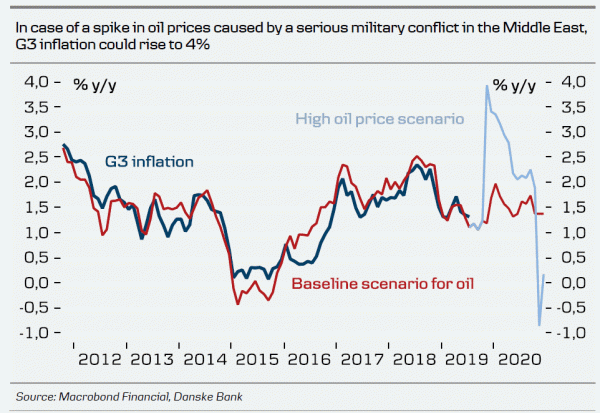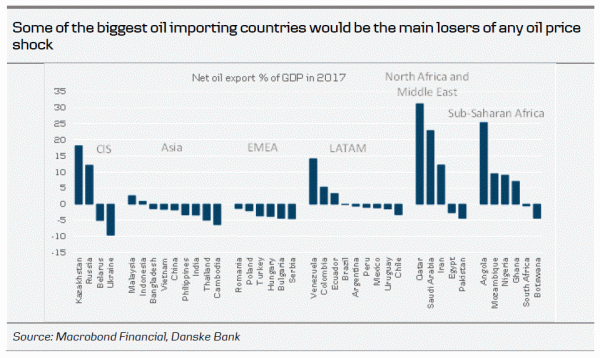Key points
- While outright military conflict between the US/Saudi Arabia and Iran remains a low likelihood,tensions likely to remain high.
- If the situation does not escalate much further, the impact on financial markets and globaleconomy should be limited.
- However, in a serious military conflict involving Iran and US/Saudi Arabia, world economy would fall into recession as oilprices could rise to USD150.
- The inflation spike would cause a sharp drop in real wages, reducing private consumption. Uncertainty would hit investments, causingcentral banks to react.
- Risky assets would sell off while safe haven assets would rally.
A war between US/Saudi Arabia and Iran could lead to asignificant oil price spike
The drone attacks by Yemeni rebels on Saudi Arabian oil fields this weekend have raised tensions in the Middle East. Following the attacks, US President Donald Trump warned Iran that if the country was linked to the attacks, the US is “locked and loaded depending on verification, but we are waiting to hear from the Kingdom.” For further discussion of the impact on oil production, see Flash Comment International: Saudi oil production under attack. During the course of yesterday, Saudi Arabia said preliminary findings showed that Iranian weapons were used in the attacks but stopped short of directly blaming the IranianIslamic Republic.
While tensions have certainly risen on the back of the weekend’s attacks, we still see relatively low risk of an outright military conflict between the US/Saudi Arabia and Iran. In general, we think the Trump administration will be very careful about entering a military conflict. A conflict would put the oil price on an upward slope, which could hurt the US consumer (see next section). Furthermore, the departure of national security advisor JohnBolton, who was advocating for military attacks on Iran, probably means a softer approach.
However, the next days and weeks will be crucial. If we see further drone attacks on Saudi oil fields, it will be difficult for the US to ignore. In such a situation, we expect the US would likely start to line up military firepower around Iran. Meanwhile, Turkey and Russia would step up diplomatic efforts to prevent a conflict (even if neither is on Iran’s side) given the geographical vicinity of Iran. Russia would be likely to act as a mediator, as ithas good relations with all three parties – Iran, Saudi Arabia and the US.
In a scenario of limited escalation, we would expect the oil market to continue to price a geopolitical premium of around USD5/bbl. We think this premium could be quite persistent as the oil market is not used to concerns over supply from Saudi Arabia. Saudi Arabia is normally the steady hand in the oil market that makes the balance when other producersexperience disruptions.
However, if the situation were to escalate significantly and the US decided to intervene militarily in Iran, it would be a significant blow to the oil market and without historical precedent. There would be the possibility of further damage to Saudi oil fields in the process. In our view, in this case we could easily see oil prices rise 200% over the course of a couple of months. That is the experience from the early 1980s following the Islamic revolution and early 1990s during the First Gulf War. From the current level, that would mean an oil price up to around USD150/bbl. We expect the price increase would persist as long as production was depressed, but could quickly return to more normal levels once oilstarted to flow again.
In the following sections we discuss the global macroeconomic and market implications of an outright military conflict between the US/Saudi Arabia on one side and Iran on the other.
Global macroeconomic implications of the Middle East tensions
In our base case of remaining tensions but limited further escalation, we are not too far from our baseline scenario of a weak global outlook with a modest recovery in 2020. While the uncertainty is a bit higher, we would not expect the growth impact to be significant. Of course, the uncertainty posed by increased tensions in the Middle East adds yet another factor to the pile of risks from the trade war and Brexit in an environment where global growth is already under pressure. We would expect this to affect companies’ spending plans mostly, while consumers tend to be less reactive unless it hits their wallets.
If the situation escalates into war and oil prices spike all the way to USD150 per barrel for some time, it would be a shock that we believe would tip the world into recession. Most estimates suggest that a permanent increase of USD10 per barrel in the oil price would reduce GDP growth in the US, euro area and Japan by around 0.3 percentage points. On average, oil prices would rise around USD40 per barrel in 2020, which according to the multipliers would subtract 1-2 percentage points from global growth after a year. With global growth currently around 2-2½%, it would clearly knock us into recession territory.
The effect would come partly through a decline in consumers’ real wage growth. Consumers are the main pillar of growth in the world currently, so any negative shock to households would be very concerning. Since oil prices drive most of the swings in headline inflation in the short term, a model for inflation based on oil prices has quite high predictive power. If oil moved to USD150 per barrel for a short time, we estimate it could push G3 up to 4% from the current level of 1½% and euro area inflation above 3.5% by year-end. This would subtract 2½ percentage points from real wage growth for some time and lead to a sharp decline in consumption growth. On top of this, we believe we would likely see a drop in machinery investments as company profits would take a hit and uncertainty would rise. Of course, oil producers would benefit, but it would be unlikely to compensate for the loss from oil consumers.
In that light, we also have a hard time seeing this as a game changer for euro area core inflation. Although we would expect higher inflation rates in some travel-related core items such as package tours and transport services, others would likely fall due to the negative demand shock, mitigating a rise in core inflation to something like 0.1-0.2pp from current levels.
We think that global central banks would support the economies in view of the negative shock. While a rise in oil prices would lead to a spike in inflation, we would expect the Fed to put more weight on the negative growth impact and cut rates aggressively. We already expect the Fed to cut rates to below 1% by March in our baseline scenario and a US recession triggered by a war with Iran would, in our view, lead to the Fed cutting rates all the way to zero. The rise in inflation would likely be seen as temporary and we expect any spillover to core inflation would be muted by a lack of pricing power in a scenario where consumer spending is severely eroded by lower real wages. In the ECB’s case, we expect it would use the rate cut tool first given public resistance to the QE programme. However, should the recession drag on/become more severe, we think the ECB would scale up the QE programme, including new asset classes such as senior financial bonds.
In the scenario we have outlined, we expect oil prices would come back down again quite fast after the immediate shock. This is of course hard to predict but is one possible scenario in the case of a short war. In that case, the negative shock would dissipate and the decline in inflation turn into a big boost to real wage growth and thus private consumption. Hence, based on this, the recession would prove short. However, much depends on the exact developments in a possible war and, hence, oil prices.
Market implications
So far, the market reaction to the current geopolitical escalation has been rather negligible. Oil prices have risen slightly but the equity, FI and FX markets have moved within what is really just normal volatility.
Should oil prices indeed spike well above 100 and assuming this led to some sort of global recession via the erosion of consumer purchasing power, we expect the market reaction would likely be similar to what we have seen on other occasions: equities would likely fare poorly and risk currencies (including Scandies) would likely struggle. The classic havens such as the USD, CHF and JPY would likely see major tailwinds.
In the emerging markets, we expect an oil price increase would have a diverging impact depending on their status as net oil importers or exporters. Notably, oil-sensitive currencies of the net crude importers, such as the TRY and the INR, would come under pressure in a deteriorating scenario. The RUB would be one of the winners, but its appreciation would remain limited by Russia’s Ministry of Finance. According to its budget rule, increases in oil prices push up FX purchases, which mitigates any RUB excessive strengthening.



